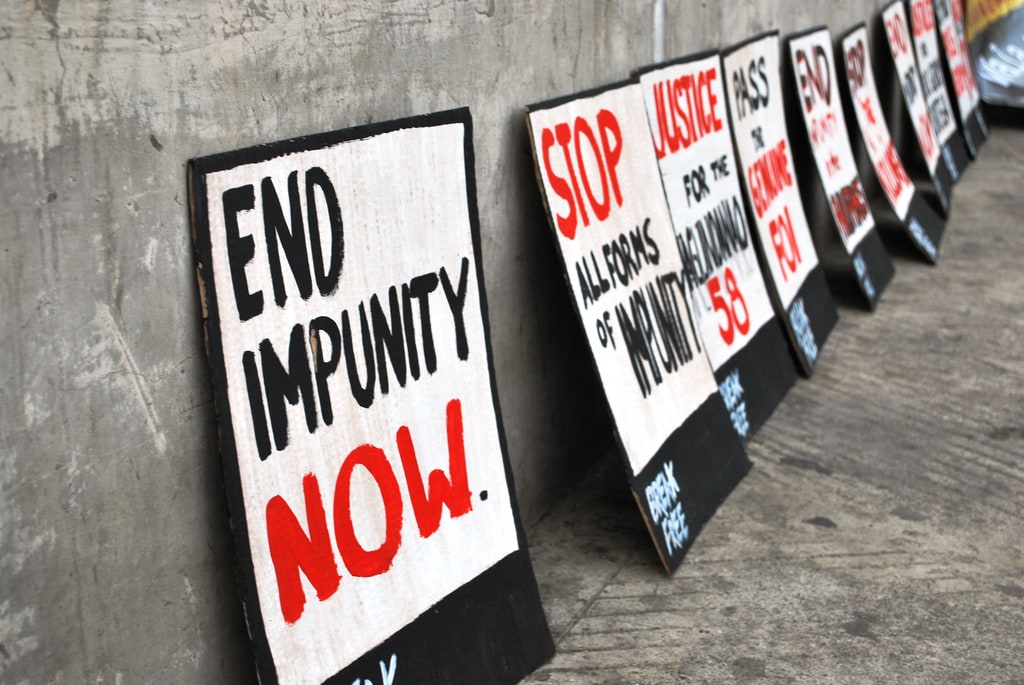On the inaugural UN International Day to End Impunity for Crimes Against Journalists, IFEX asks: If killing journalists is killing the messenger, what message are governments sending when their killers get away with it?
On 13 November 2013, David Rohde published an article entitled “An Epidemic of Journalist Kidnapping”. Under a photograph of James Foley, who had then been missing for a year, the article highlighted the situation in Syria where 30 journalists had been kidnapped or disappeared – half of them Syrian, half of them foreign reporters.
The author was well-positioned to write on this subject. A Pulitzer Prize-winning investigative journalist and author, he was kidnapped by the Taliban in Afghanistan in 2008 and spent 7 months and 10 days in captivity.
Today, a year after Rohde’s article went to press, Foley’s name has been added to the list of more than 700 journalists since 1992 who have been killed for doing their jobs. In Foley’s case as well as others the horror has been compounded by their killers’ subsequent use of social media, using the killings as a peculiarly gruesome public relations tool.
Always risky, the situation for reporters covering conflict has worsened in recent years. Where formerly the word “Press’ was worn as a protective measure, now it’s seen as a bullseye, with militant groups assessing journalists’ value as pawns in their power struggles.
Not all journalist kidnappings or murders make international headlines, nor do the majority of deaths take place in war zones. Most of those attacked are local journalists, reporting in their own countries. Those who would bring us the truth, covering crime, conflict or corruption, are increasingly targeted and silenced. But whether it is an ultra violent jihadist group like ISIS, a crime syndicate, or shadowy figures doing the dirty work for corporations or governments, the motives behind attempts to silence the media are clear, and it’s equally clear why we cannot allow that to happen.
This is where impunity comes into the equation. The killers are getting away with it. The reality of systemic impunity for crimes committed against journalists is not in question. According to the latest figures from UNESCO, there have been convictions in fewer than 10% of cases of journalists killed since 2006.
How this climate chills free expression and stifles access to information around the world is known. The impact that suppressing freedom of expression has on the ability to monitor and defend all human rights is undeniable.
Rather than argue these points yet again we want to send out one very clear message: Reducing impunity is an achievable goal.
This year, IFEX’s campaign actions aim to turn the heat up on the role of governments in this work. Some are already on board and indeed have been champions of this work. Others need more encouragement.
In the weeks leading up to this Inaugural UN International Day to End Impunity for Crimes Against Journalists, 2 November, we sent letters to all UN missions, calling on governments to do their part – to use UN mechanisms to address the problem of impunity for crimes against journalists in their own countries.
Our focus is on two mechanisms: the UN Plan of Action on the Safety of Journalists and the Issue of Impunity, a multi-stakeholder strategy launched in 2012, and the Biennial UNESCO Director General’s Report on the Safety of Journalists and the Danger of Impunity, which tracks and reports on progress in unsolved cases of crimes against journalists. Together they represent a chance to make tangible, lasting progress – to establish safer conditions for journalists and end the climate of impunity for crimes against them.
We want to make sure everyone understands the problem of impunity, how these UN mechanisms work and how they can get involved. To that end, we’ve produced campaign resources including two fact sheets, an infographic and a map of impunity hot spots around the world.
We know that governments acting alone will never solve the problem. A strong and empowered civil society, a credible and transparent legal system, courageous lawyers, the passionate and unrelenting actions of individuals monitoring violations, spreading awareness, promoting the safety of journalists and demanding justice – will always be at the forefront of the struggle to end impunity.
This year IFEX is using its voice – the voice of more than 90 non-governmental organisations in over 60 countries working to defend and promote freedom of expression – to remind governments of their responsibility and actions they should take – not just in November, but year-round. We vow to hold them accountable. To cut impunity off at the roots, we will be strategic, we will be united, and we will be loud.
If killing journalists is killing the messenger, what message does it send when their killers get away with it? Please join your voice to ours this year, and send out a new message. Demand that your governments do their part to end impunity.
Annie Game
Executive Director, IFEX
